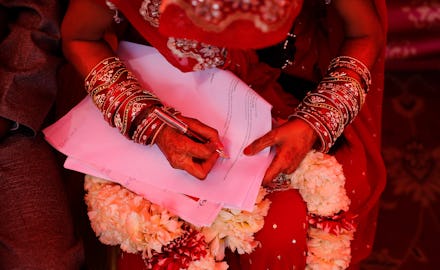Marital Rape Case Shows the Ugly Truth About the Battle for Women's Rights in India

What is forced sex in marriage called? Not rape, according to Indian law.
A woman who alleged that she was forced into marriage and subsequently raped by her husband was told by the Delhi high court earlier this month that the incident is not considered rape under Indian law.
Headlines around the world have been proclaiming the ruling as the legalization of marital rape in India, but it's important to remember that it was never illegal in India in the first place. The discussion, however, has been heightened now that the highly-publicized gang rape of a woman in Delhi has prompted revision of the country's colonial era rape laws.
Last year, India's rape laws were updated to make provisions for increased sentences for rape convicts, and stringent punishment for offenses such as acid attacks, stalking and voyeurism. However, the new reforms did not extend to the question of marital rape under the pretense of protecting the traditional institution of marriage and family values. It wouldn't be presumptuous to say that if the December 2012 Delhi gang rape victim had been raped by her partner in her bedroom, instead of by strangers inside a moving bus, there wouldn't have been a similar kind of outrage.
Image Credit: AP. Women protest after a woman was gang raped in Delhi in December 2012.
Marriage and rape — two words that should not belong together — have an unfortunate continued relationship in India. In a very dangerous way, both rape and marriage are considered ways of claiming a woman's body. That not only makes marital rape legal; it also means that marriage is seen as a solution to rape.
The stigma attached to rape, particularly if the victim is an unmarried woman, means that in some cases, marriage to the rapist is seen as the way to resolve the "situation" at hand.
In 2005, a hospital orderly who raped a nurse and gouged out her eyes told the court that he was a reformed man, and willing to marry the woman because no one else would. The court had the audacity to ask the victim to consider the offer — which she rejected. Instead, she asked that her rapist receive "severe punishment," and the court sentenced him to life in prison.
However, in another case from 2007, a man accused of raping a 16-year-old married her in the presence of her family before the trial was even concluded.
The legitimacy of claiming a woman's body is also exemplified in the infamous Imrana rape case. Back in 2005, 28-year-old Imrana, a mother of five, was raped by her 69-year-old father-in-law. When Imrana filed a complaint, she was told by the local council (panchayat), that her marriage to her husband was now void, and she was to treat him as her son, by virtue of having had sex with her father-in-law. Luckily, Imrana's husband stood by her, and the father-in-law was eventually sentenced to 10 years in jail. But in cases where husbands refuse to take their wives back, and sometimes even allege illicit affairs — after they have been raped — are not unheard of.
Image Credit: AP. Ali Mohammed, center, was sentenced to ten years in prison for raping his daughter-in-law.
Yes, India needs a discussion on rape within marriage, but this won't be solved without a wider discussion on how it is still unacceptable to consider marriage a solution to rape. The presumption of sexual consent is already a problem, because it is a slippery slope: if it can be presumed in marriage, perhaps it can also be presumed on a date, when she's drunk, after she's held hands and kissed, when she's been flirtatious, or when she's wearing short clothes and "asking" for it.
Every part of this picture is tied together, and it all boils down to a refusal to centralize a woman's ownership over her own body. For India's activists, this has not been an easy battle, and one that is not yet complete.
The refusal to criminalize marital rape is yet another reminder that women are not considered to be the owners of their own bodies. And that's a stance that India should be ashamed of.